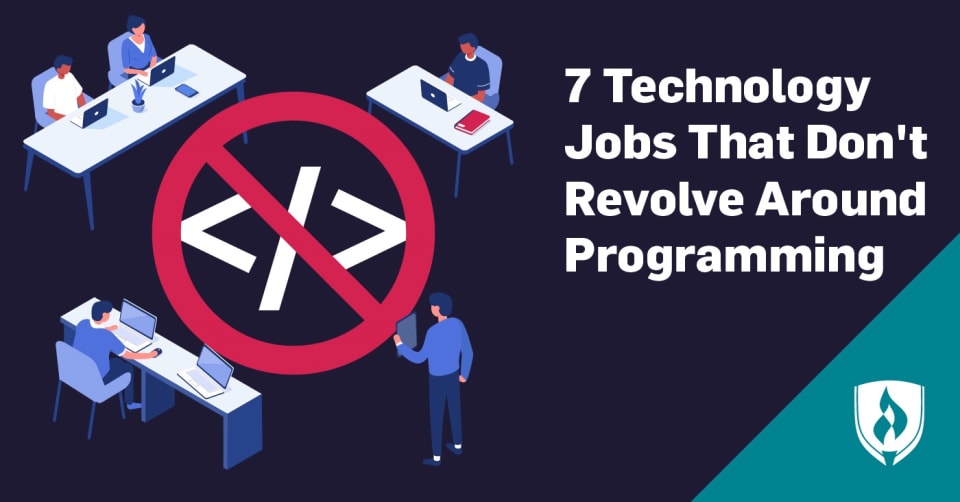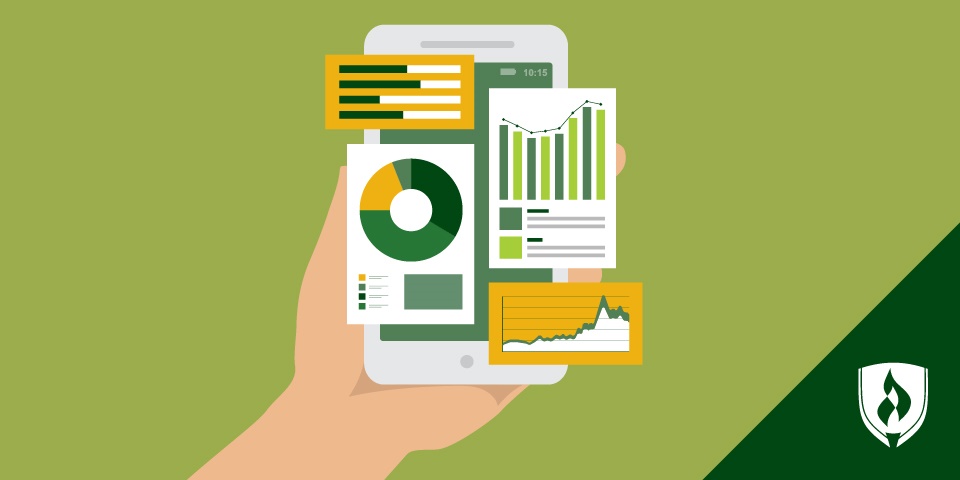
You’re drawn to the innovative tech field for many reasons. Working with computers and thinking of the possibilities they can unlock sounds like a pretty cool way to earn a living—and with tech jobs, that has the potential to be a pretty good living.
But there’s just one thing holding you back from pursuing your dream of working in technology: you’re not a programmer, and the idea of learning and keeping up with a myriad of new languages really doesn’t sound appealing. So, does that mean you’re completely out of luck? Absolutely not! There are several tech-centric jobs that require little, if any, programming knowledge. Let’s dive into some of the common options out there.
7 of the best tech jobs for “non-programmers”
It’s a common misconception that technology careers all revolve around programming. In reality, there are plenty of non-programming computer jobs available in the technology field.
“The tech job market has matured,” says Jerod Greenisen, product marketing manager at SalesReach.io. “Now, the needs of teams are more diverse and the problems facing technology firms are more complex and nuanced.”
We spoke with experts in the field and researched technology job descriptions to bring you the best IT jobs for non-programmers. Read on to discover a tech career that might be right for you!
1. Information technology (IT) project manager
Technology projects have a lot of moving parts. IT project managers oversee projects from start to finish, making sure that no details are lost in the shuffle and that the project comes in on time and on budget.
“I hold weekly planning meetings to monitor the health and progress of the project, relay new information or direction given by the client, and ensure our people have everything they need to get their work done,” says Casey Harding, technical project manager at Objective.
IT project managers don’t do programming tasks themselves, but they do need a basic understanding of what’s happening on the technical side. “Being able to communicate in a clear and concise way is critical, especially when having to act as a sort of ‘translator’ between the development team and clients who typically don’t have a programming background,” Harding says.
2. IT support specialist
IT support specialists help customers and clients set up and learn to use new equipment and software, as well as troubleshoot any errors. They need to be extremely familiar with the equipment and programs they work with, but they won’t be required to write a single line of code.
This role is a blend of customer support and technical know-how, according to Danielle Wheeler, help desk lead at Guardian Computer. “On the one hand, you need the technical knowledge to diagnose and resolve IT issues. At the same time, you need strong interpersonal skills to develop trusting customer relationships and provide IT support remotely.”
This career helps users by combining technical skills in data restoration, software and hardware with patience, communication and interpersonal skills.
3. User experience (UX) designer
The design behind websites, applications and other technology is about more than just looking pretty. UX stands for user experience, which refers to the way end users experience a product. UX designers follow basic guidelines to make sure that users are easily able to navigate their product and find the information they’re looking for.
“It is about looking at the digital technology from the user’s perspective,” says Drew Falkman, director of strategy at tech consulting company Modus. UX designers conduct lots of research to make sure they fully understand the end user’s point of view so that the design they create reflects their needs.
Although UX design doesn’t require programming prowess, these designers do need skills in programs like Adobe Creative Suite. They also rely on soft skills like creativity, research and problem-solving to create designs that are functional for users.
4. Product marketing manager
Even the most groundbreaking new technology doesn’t sell itself. These industry professionals combine their knowledge of technology with their powers of persuasion to market their organization’s products and services.
“I collaborate with the engineering team and the sales team to better position our product to grow revenue,” Greenisen says. “Tech firms like the one I work for need marketers, creatives and great communicators to bring their offerings to the market.”
Greenisen shares that, with so many new technology offerings available, many customers are swayed by brand perceptions rather than a product’s actual capabilities. Product marketing managers use their strong communication skills to showcase the technical details that make their product stand out above the rest.
5. Product manager
Not to be confused with product marketing managers, these tech professionals focus on creating products users actually want. They use the information gathered by data analysts to make decisions about how to improve existing products and what projects to focus on next.
“This person is in charge of building the right thing, and building that thing right,” Falkman says. “They can lead user research to talk to users and see how their technology can best help them with new features and new apps.”
There’s no coding required for this tech career, but product managers do work with engineers to make sure that the product is being built correctly and meets stakeholders’ needs. In addition to management abilities, product managers also need to be top-notch communicators who can keep everyone informed and aligned about the development of a new product.
6. Information security analyst
These tech pros are responsible for keeping critical data out of the hands of hackers or other unwanted visitors. They plan and implement security measures like firewalls, data encryption, and data recovery fail safes to help keep organizational data safe—and, in the event of a breach, minimize damage.
Information security analysts don’t rely on solely on programming to protect from hackers, but they do require some savvy tech skills. The U.S. Department of Labor reports that they should be familiar hardware systems, network monitoring software and virus protection software, among others.1 It should be noted that the information security field is fairly broad, and analysts often focus on a niche subset of expertise—so some roles may be more coding and programming-focused.
7. Network administrator
Network administrators are responsible for the installation, configuration and maintenance of the hardware and software systems used to keep an organization’s devices connected. This role certainly requires plenty of technical know-how, but the vast majority of it does not require extensive coding or programming skills (though they can come in handy for automating tedious processes).
These professionals play a key role in keeping a business or organization up and running, and are often the first people turned to in the event of a widespread outage or network failure. That means there can be some “crunch time” pressure and long hours if something has gone wrong, but most can expect a fairly regular schedule that mirrors regular business hours.
Which technology role is right for you?
So, what’s the best IT job for non-programmers? Now you know that there are plenty of non-programming computer-centric jobs to choose from!
No matter which non-programming technology job suits your natural skills and interests, there’s a technology education program to get you started. Take the first step toward your new tech career path by exploring the Technology programs available at Rasmussen College.
Related Articles:
1U.S. Department of Labor, Occupational Employment Statistics, [accessed September, 2020] www.bls.gov/oes/. Information represents national, averaged data for the occupations listed and includes workers at all levels of education and experience. This data does not represent starting salaries. Employment conditions in your area may vary.
This article was originally published in 2015. It has since been updated to include information relevant to 2020.




